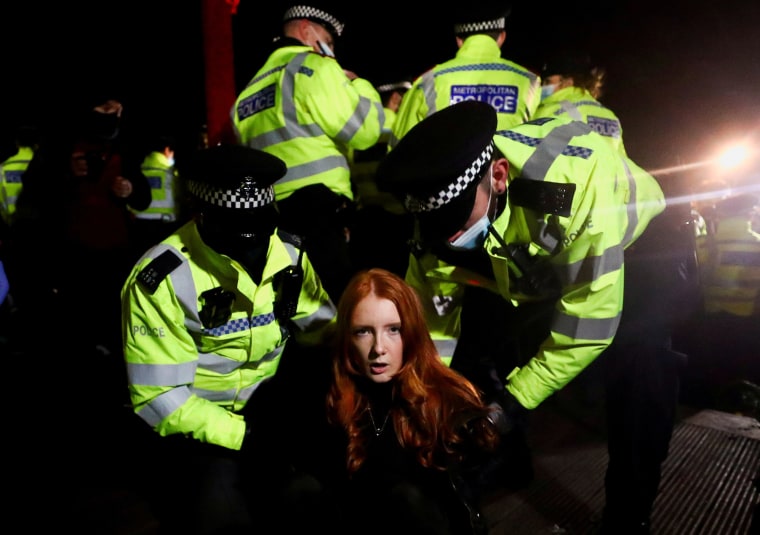LONDON — Patsy Stevenson said she only intended to observe the vigil for Sarah Everard, whose disappearance while walking home in London has captivated and appalled the nation.
But, staring down the camera while two officers restrained her on the ground, Stevenson has become a symbol of the protests themselves.
Stevenson, one of three women detained at the event amid scuffles with police, told Sky News that she never wanted the notoriety but would try and use it to force change anyway.
“I accidentally went viral,” she said. “The only way that I can make this not in vain is to not make it political, not make it against the police or against anyone. It literally is just about the safety of women.”

“We need to change the system where women don't have a voice and it isn't safe for women to walk down a street,” Stevenson said.
Despite her reluctance to be “thrown into the public eye,” Stevenson, along with Everard, continued to trend on Twitter in the United Kingdom on Monday.
Stevenson was among around 1,000 at the mass gathering Saturday to honor Everard, 33, a marketing executive. The official vigil was earlier canceled by organizers after law enforcement said it would violate national lockdown measures.
On Friday, Wayne Couzens, an elite officer with London Metropolitan Police’s diplomatic protection command, was charged with Everard’s kidnapping and murder.
Everard's disappearance on March 3 and the discovery of her body a week later triggered an outpouring of anger and sadness over the low conviction rates for those who commit violence against women in the U.K., and prompted reaction from politicians across the political spectrum.
Download the NBC News app for breaking news and politics
Prime Minister Boris Johnson is set to meet with senior Cabinet members Monday to discuss strategies to combat violence against women and girls. The meeting comes amid more planned protests outside Parliament.
“Like everyone who saw it, I was deeply concerned about the footage from Clapham Common on Saturday night,” Johnson said in a statement released Sunday, referring to images from the impromptu vigil in south London.
Johnson commissioned two reviews into how Saturday’s vigil was handled but stopped short of joining growing calls for the head of London Metropolitan Police to resign.
Police Commissioner Cressida Dick has defied such calls, calling the vigil “an unlawful gathering, which posed a serious risk to people’s health according to the regulations.”
She defended her officers who had to conduct “fiendishly difficult policing” to disperse the mass gathering but “fully” understood “the strength of feeling,” especially from women.
“I wouldn't have wanted to see a vigil in memory of Sarah end with those scenes,” Dick added.
Everard was last seen walking home on a busy London street earlier this month. Closed circuit television footage showing her wearing brightly colored clothing on a well-lit street has become etched in the minds of many women who take similar precautions when walking alone after dark.
Jamie Klingler, an organizer at the group Reclaim these Streets, told NBC News that that imagery has become “painful” for many women because the onus of their safety falls on them, despite the behavior of male perpetrators.
“She was abducted and killed and it struck fear into the heart of all of us,” she added.
The furor following Everard's death upset some of those closest to the slain woman. An opinion piece written by one of her friends, Helen Edwards, asked for the politicization of Everard's death to stop.
“Her abduction and murder is not, in my opinion, a symptom of a sexist, dangerous society. When something awful like this happens, there is a rush to look for reasons and apportion blame,” Edwards wrote.
The impact of Everard's killing continues to reverberate in public conversations about violence against women around the globe.
“The reason why the killing of Sarah Everard has shocked us all is because it could have been any one of us,” Rothna Begum, a senior women's rights researcher at Human Rights Watch, said.
“Now what’s really resonating is, ‘Why was she killed? How was it that she happened to be killed just for simply walking home at night?’”
Unrelated to Everard's murder case, a policing bill is set to have its second reading in Parliament this week. The nearly 300-page bill has quickly become controversial off the heels of the police response, prompting some lawyers to say it would “hugely expand” policing powers and spurring criticism from several opposition politicians, who now plan to vote against the legislation.
The #PolicingBill hashtag was trending on Twitter in the U.K. on Monday.
